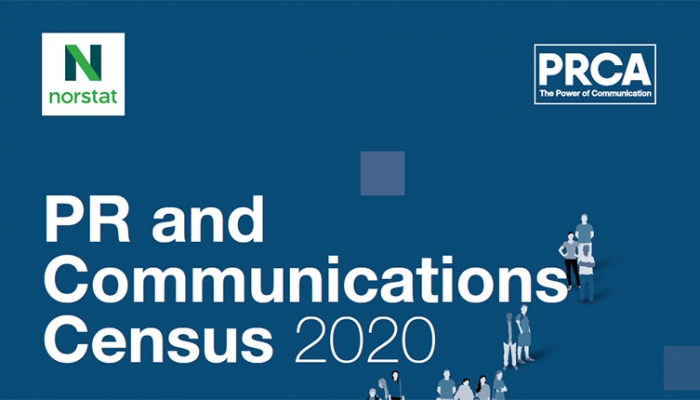PRCA releases its 2020 PR and Communications Census
Results from the PRCA’s annual PR and Communications Census show a snapshot of an industry with much to do to protect the mental health of practitioners, close the gender pay gap and become racially equitable – issues that have either stagnated or worsened during the economic struggles of the COVID-19 pandemic.
The 2020 Census, sponsored and undertaken by Norstat, brings together data from March and October and is based on responses from 1,251 public relations practitioners across the UK.
The impact of the global coronavirus pandemic has taken a toll on PR professionals at both home and at work, according to the results. 34% of respondents having suffered from or been diagnosed with mental ill health, and work/life balance has taken a hit since March, with 44% of respondents admitting to sending emails and making calls outside of work hours.
While data gathered in March predicted another year of growth for the industry, with a workforce of 97,300 before the pandemic and a contribution of £15.7bn to the economy, 34% of survey respondents now report organisational redundancies. A widening of the gender pay gap is also a worrying statistic from the report – the 14% gap in 2019 rose to 15% in March 2020. October’s data suggests a further rise to 21%, which, even with the proviso that a larger number of senior respondents took part in the later survey, is startling for a year where equality has been a major discussion across the globe.
On the work being done to welcome more ethnic diversity into the PR industry across all levels, the data shows slow progress. 10% of 2019’s PR workforce identified as Black and ethnically diverse, while 2020’s percentage has risen a miniscule amount, to 12%. Practitioners from these backgrounds are also mainly in junior roles. 88% of managing directors identify as White British, while 54% of account executives identify that way. Class inequality also continues to be a problem – the percentage (21%) of PRs who attended fee-paying schools is three times the national average (7%).
Of the results, PRCA REEB chair Barbara Phillips said: ‘We know we are better than these latest statistics. We are the ones who convince and cajole our client’s customers and audiences to engage with products and services because they identify with a narrative. What narrative do these latest stats tell? Currently the PR and communications narrative in regard to ethnic diversity is one that urgently needs rewriting.
‘We already have a great deal of qualitative information and these latest numbers are shocking. Let’s refresh our industry’s reputation among diverse groups and make the changes that welcomes everyone to an industry that, if you stay, can offer the most amazing experiences.’
PRCA director general Francis Ingham sees an opportunity for change: ‘For too long, our industry has recruited and promoted in its own image. There is no place for unethical cultures that tolerate inequality; next year will see the launch of our new diversity module within the CMS designed to raise standards across the industry. Our industry must do better – empathy and ethics must form the heart of our industry’s recovery from the pandemic.’
Read the full results from the PRCA PR and Communications Census here.





Leave a Comment